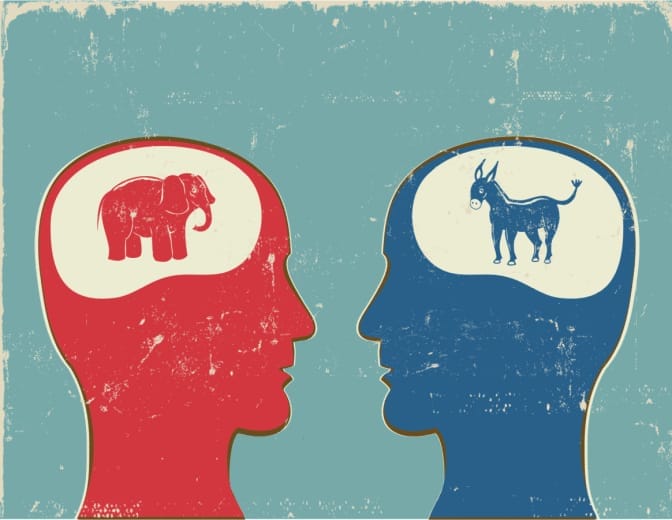Ask the average American to define “partisan,” and chances are he’ll equate it with inflexibility, dogmatism and adherence to the party line.
The 11th edition of Merriam-Webster stands shoulder to shoulder with Mr. Average American, defining “partisan” as “a firm adherent to a party, faction, cause or purpose; especially one exhibiting blind, prejudiced and unreasoning allegiance.”
Blind? Prejudiced? Unreasoning? Why it’s widely known that the good my party has done far outstrips whatever good the opposing party has done—if, indeed it has ever done any good. And the wrongs the opposition has committed? Much too numerous to list here. And well beyond any wrong my party has committed—if, in truth, my party has ever committed any wrong. What’s unreasoning about that?
With this mindset prevalent throughout the nation, can anything positive get done? Even when their bargaining favors a common good—improved education or a fairer tax code—politicians on both sides seem unwilling to yield their cherished beliefs in favor of cooperation. In an interview on CBS’s 60 Minutes, John Boehner, the speaker of the House, gave this answer to Lesley Stahl’s question about compromise: “I reject the word.”
Yes, rigidity is imbedded in the partisan DNA. But a major reason behind this intransigence is the media. Conflict sells. They’ve taken the simple act of changing one’s mind, redubbed it “flip-flopping” and virtually criminalized it. In such an adversarial atmosphere, what politician would dare compromise? Concede a point to your opposition by backing off, and you’re guilty of backing down.
The electorate has grown aware of this. And weary of it too. Their anguished pleas for leaders who can bring Washington together grow louder each election cycle. Yet they accept partisan politics as part of their daily lives. They fail to see that it has gone too far. What they once accepted as mere antagonistic rhetoric now borders on hate speech. “Liar” and “hypocrite” cross the airwaves hourly. Blistering ridicule has elevated second-rate nightclub comics into TV millionaires.
Today’s language will not allow compromise. It has pushed us, unnoticed, to a new stage: acceptable bigotry. If “bigotry” falls too harshly on your ears, reopen that same dictionary:
Bigot: A person obstinately or intolerantly devoted to his or her own opinions and prejudices; especially one who regards or treats the members of a group (as a racial or ethnic group) with hatred and intolerance.
The line has now become so thin between partisan and bigot, there hardly seems room to slip a piece of paper between them. The line needs to be redrawn, which is not easy in a free-speech society.
But it can be done. It has been done. Ronald Reagan and Tip O’Neill kept a firm grip on their conflicting political philosophies while mutually loathing legislative deadlock. If we are to move forward, we must elect politicians with like attitudes, people who prefer progress to stalemate, achievement over the status quo. A philosophy that soft pedals partisan politics, that places progress before party, may be the only route to enlightened compromise.

























